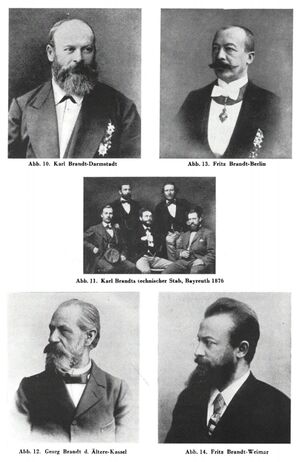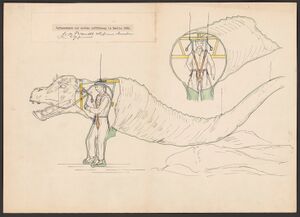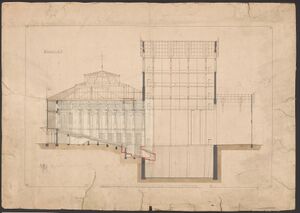In the 19th and early 20th centuries, the Brandt family significantly shaped stagecraft practice at Germany’s major court theatres. Their influence was largely based on traditions of practical knowledge, transferred between members of the family.
In the absence of textbooks, training standards or legal requirements for the profession of stage technician, the professional practice in the 19th century was determined by the personal transmission of knowledge, and the social position at court.
Favoured by courtly privileges, the Brandt family (Q4822) passed on practical knowledge from father to son, from master to pupil. Theoretical-systematic foundations hardly existed; stagecraft found its conventionalised methods of work dictated by the theatre architecture. The stage-technical practice and the technical set-up of new theatre buildings were characterised by tried and tested procedures, technical solutions for staging problems and a few prominent stage reform ideas from professional authorities. Through a circle of students that steadily expanded beyond the family, the Brandt family built an effective professional identity. In 1929, Friedrich Kranich’s influential Bühnentechnik der Gegenwart (Q264) concisely portrayed the family as the bearers of practical stage knowledge.
Probably the most defining figure of the stage technician family – not the only one, but the largest and most influential – was Carl Brandt (Q414), one of the four sons of the upholsterer and machinist Elias Friedrich Brandt (Q413). All the brothers had varying degrees of success as stage technicians. In addition to Carl’s engagements at the Munich Court Theatre and, after a brief period around 1848 at the Königstädtisches Theater Berlin, as head of machinery at the Darmstadt Court Theatre, he distinguished himself as the machinist for the first Bayreuth Festival in 1876. Not only did he realise Wagner’s ‘Ring of the Nibelung’ for the first time, but he was already involved in the planning and construction of the theatre itself.
Carl Brandt was supported by his younger brother Fritz Brandt (Q415) and his son, also Fritz Brandt (Q4821), who both studied under him. While Carl’s brother successfully directed the technical side of the Königliche Schauspiele in Berlin for more than four decades, the Brandt family’s renown was strongly linked to the Bayreuth Festival. The Brandt’s reputation benefitted from their meeting Wagner’s technical requirements, which were considered almost unsolvable.
The family’s practical expertise, in contrast to a later educational and professional practice based on abstract standards, can be placed in the more general development of art, technology and science. The Brandt family is an example of a master-pupil relationship that was common in traditional trades, but in this case privileged by the court. The socially differentiated technical professions only became more accessible when the technical universities shaped abstract, theoretical knowledge cultures. Here, even those who were not born into the profession could now acquire and apply professional knowledge. Theoretical training started to push back against a technical professional practice, which was shaped by genealogy and ideas of honour – but without completely abandoning these virtues of practical knowledge. Friedrich Kranich’s Handbuch Bühnentechnik der Gegenwart, written in the 1920s, is a paradigmatic example of theorising stage technology based on genealogical tradition.
Georg Brandt (Q4824), the son of Carl’s brother Fritz and himself a stage technician trained in the family circle, donated his father’s collection of stagecraft related material to Friedrich Kranich, who was then technical director of the Bayreuth Festival. Fritz Brandt’s estate, which was used as a basis for Kranich’s handbook and which documents the stage-technical practice of the Brandt family in the 19th and early 20th centuries in a wealth of material, has been digitised by the Theatre History Collections of Freie Universität and made available in a database (Q4826). Today, experience and expertise are spread through training, education and standards as well as learning on-the-job, but in the 19th century, personal and social links were critical to the transmission of stagecraft and the building of the technical stage profession.


